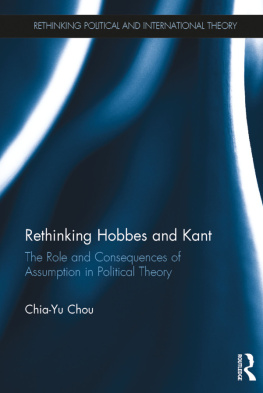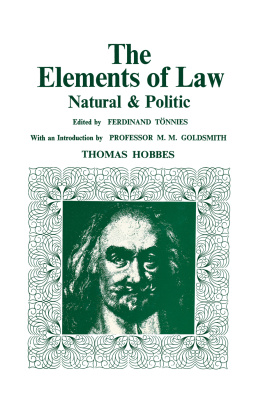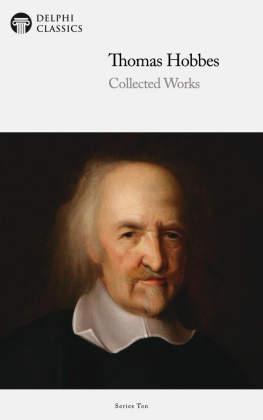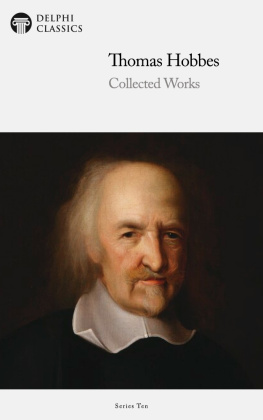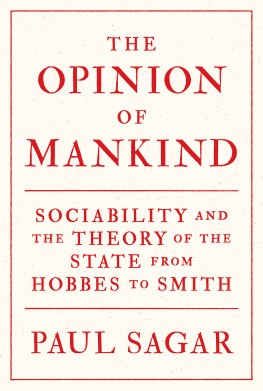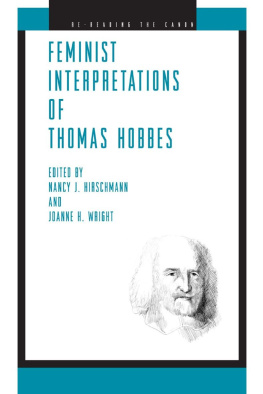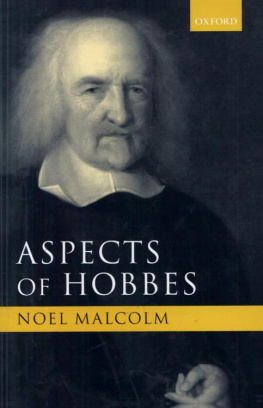FEMINIST
INTERPRETATIONS
OF
THOMAS HOBBES
RE - READING THE CANON
NANCY TUANA, GENERAL EDITOR
This series consists of edited collections of essays, some original and some previously published, offering feminist re-interpretations of the writings of major figures in the Western philosophical tradition. Devoted to the work of a single philosopher, each volume contains essays covering the full range of the philosophers thought and representing the diversity of approaches now being used by feminist critics.
Already published:
Nancy Tuana, ed., Feminist Interpretations of Plato (1994)
Margaret Simons, ed., Feminist Interpretations of Simone de Beauvoir (1995)
Bonnie Honig, ed., Feminist Interpretations of Hannah Arendt (1995)
Patricia Jagentowicz Mills, ed., Feminist Interpretations of G. W. F. Hegel (1996)
Maria J. Falco, ed., Feminist Interpretations of Mary Wollstonecraft (1996)
Susan Hekman, ed., Feminist Interpretations of Michel Foucault (1996)
Nancy Holland, ed., Feminist Interpretations of Jacques Derrida (1997)
Robin May Schott, ed., Feminist Interpretations of Immanuel Kant (1997)
Cline Lon and Sylvia Walsh, eds., Feminist Interpretations of Soren Kierkegaard (1997)
Cynthia Freeland, ed., Feminist Interpretations of Aristotle (1998)
Kelly Oliver and Marilyn Pearsall, eds., Feminist Interpretations of Friedrich Nietzsche (1998)
Mimi Reisel Gladstein and Chris Matthew Sciabarra, eds., Feminist Interpretations of Ayn Rand (1999)
Susan Bordo, ed., Feminist Interpretations of Ren Descartes (1999)
Julien S. Murphy, ed., Feminist Interpretations of Jean-Paul Sartre (1999)
Anne Jaap Jacobson, ed., Feminist Interpretations of David Hume (2000)
Sarah Lucia Hoagland and Marilyn Frye, eds., Feminist Interpretations of Mary Daly (2000)
Tina Chanter, ed., Feminist Interpretations of Emmanuel Levinas (2001)
Nancy J. Holland and Patricia Huntington, eds., Feminist Interpretations of Martin Heidegger (2001)
Charlene Haddock Seigfried, ed., Feminist Interpretations of John Dewey (2001)
Naomi Scheman and Peg OConnor, eds., Feminist Interpretations of Ludwig Wittgenstein (2002)
Lynda Lange, ed., Feminist Interpretations of Jean-Jacques Rousseau (2002)
Lorraine Code, ed., Feminist Interpretations of Hans-Georg Gadamer (2002)
Lynn Hankinson Nelson and Jack Nelson, eds., Feminist Interpretations of W.V. Quine (2003)
Maria J. Falco, ed., Feminist Interpretations of Niccol Machiavelli (2004)
Rene J. Heberle, ed., Feminist Interpretations of Theodor Adorno (2006)
Dorothea Olkowski and Gail Weiss, eds., Feminist Interpretations of Maurice Merleau-Ponty (2006)
Nancy J. Hirschmann and Kirstie M. McClure, eds., Feminist Interpretations of John Locke (2007)
Penny A. Weiss and Loretta Kensinger, eds., Feminist Interpretations of Emma Goldman (2007)
Judith Chelius Stark, ed., Feminist Interpretations of Augustine (2007)
Jill Locke and Eileen Hunt Botting, eds., Feminist Interpretations of Alexis de Tocqueville (2008)
Moira Gatens, ed., Feminist Interpretations of Benedict Spinoza (2009)
Marianne Janack, ed., Feminist Interpretations of Richard Rorty (2010)
Maurice Hamington, ed., Feminist Interpretations of Jane Addams (2010)
FEMINIST
INTERPRETATIONS
OF
THOMAS HOBBES
EDITED BY
NANCY J. HIRSCHMANN
AND
JOANNE H. WRIGHT

Chapter 5 was previously published as Gordon J. Schochet, Thomas Hobbes on the Family and the State of Nature, Political Science Quarterly 82 (September 1967): 42745. Reprinted by permission from the Academy of Political Science.
An earlier version of chapter 9 was previously published as Wendy Gunther-Canada, Catharine Macaulay on the Paradox of Paternal Authority in Hobbesian Politics, Hypatia 21 (May 2006): 15073. Wendy Gunther-Canada. Material used with permission from John Wiley and Sons.
Library of Congress Cataloging-in-Publication Data
Feminist interpretations of Thomas Hobbes / edited by Nancy J. Hirschmann and Joanne H. Wright.
p. cm.(Re-reading the canon)
Summary: A collection of essays analyzing the seventeenth-century British political theorist
Thomas Hobbes from a feminist perspectiveProvided by publisher.
Includes bibliographical references and index.
ISBN 978-0-271-05635-7 (cloth : alk. paper)
ISBN 978-0-271-05636-4 (pbk. : alk. paper)
1. Hobbes, Thomas, 15881679.
2. Feminist theory.
I. Hirschmann, Nancy J.
II. Wright, Joanne H. (Joanne Harriet), 1966
B1247.F46 2012
192dc23
2012028428
Copyright 2012 The Pennsylvania State University
All rights reserved
Printed in the United States of America
Published by The Pennsylvania State University Press,
University Park, PA 16802-1003
The Pennsylvania State University Press is a member of the Association of
American University Presses.
It is the policy of The Pennsylvania State University Press to use acid-free paper. Publications on uncoated stock satisfy the minimum requirements of American National Standard for Information SciencesPermanence of Paper for Printed Library Material, ANSI Z39.48-1992.
To Ross Rudolph, who first cultivated my interest
in Hobbes and his world.J.W.
To Dick Flathman, who taught me about Hobbes
as much by example as by exegesis.N.H.
Contents
Preface
Nancy Tuana
Introduction: The Many Faces of Mr. Hobs
Joanne H. Wright and Nancy J. Hirschmann
1 Hobbes, History, Politics, and Gender: A Conversation with Carole Pateman and Quentin Skinner
Conducted by Nancy J. Hirschmann and Joanne H. Wright
Preface
Nancy Tuana
Take into your hands any history of philosophy text. You will find compiled therein the classics of modern philosophy. Since these texts are often designed for use in undergraduate classes, the editor is likely to offer an introduction in which the reader is informed that these selections represent the perennial questions of philosophy. The student is to assume that she or he is about to explore the timeless wisdom of the greatest minds of Western philosophy. No one calls attention to the fact that the philosophers are all men.
Though women are omitted from the canons of philosophy, these texts inscribe the nature of woman. Sometimes the philosopher speaks directly about woman, delineating her proper role, her abilities and inabilities, her desires. Other times the message is indirecta passing remark hinting at womens emotionality, irrationality, unreliability.
This process of definition occurs in far more subtle ways when the central concepts of philosophyreason and justice, those characteristics that are taken to define us as humanare associated with traits historically identified with masculinity. If the man of reason must learn to control or overcome traits identified as femininethe body, the emotions, the passionsthen the realm of rationality will be one reserved primarily for men, with grudging entrance to those few women who are capable of transcending their femininity.
Feminist philosophers have begun to look critically at the canonized texts of philosophy and have concluded that the discourses of philosophy are not gender-neutral. Philosophical narratives do not offer a universal perspective, but rather privilege some experiences and beliefs over others. These experiences and beliefs permeate all philosophical theories whether they be aesthetic or epistemological, moral or metaphysical. Yet this fact has often been neglected by those studying the traditions of philosophy. Given the history of canon formation in Western philosophy, the perspective most likely to be privileged is that of upper-class white males. Thus, to be fully aware of the impact of gender biases, it is imperative that we re-read the canon with attention to the ways in which philosophers assumptions concerning gender are embedded within their theories.
Next page


